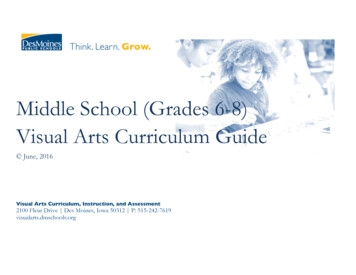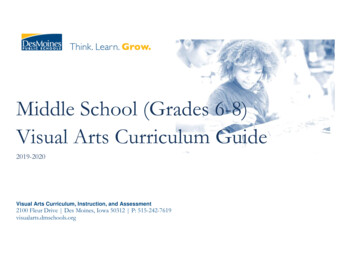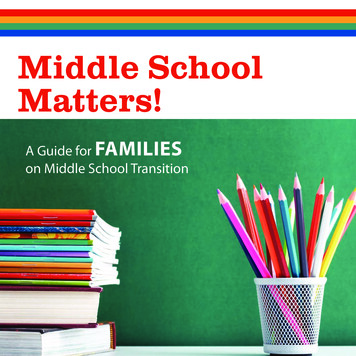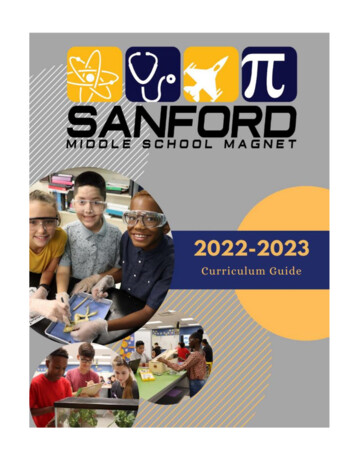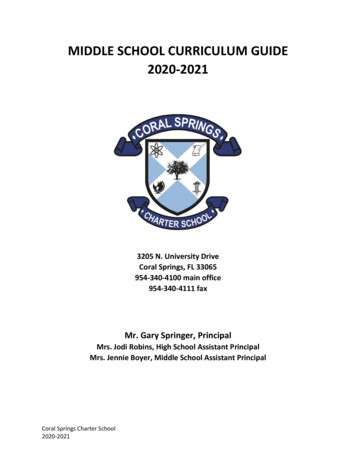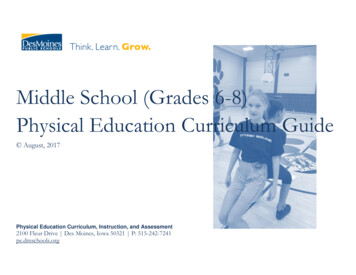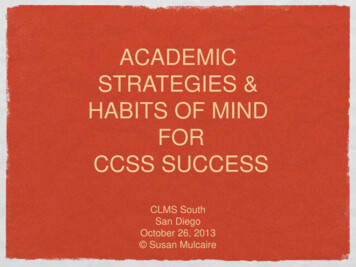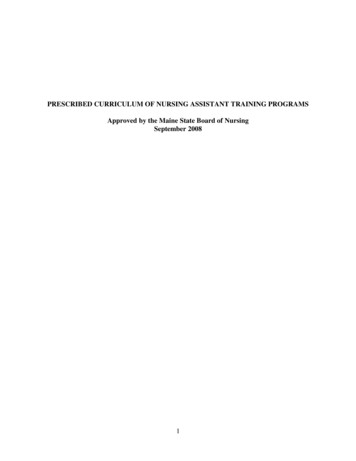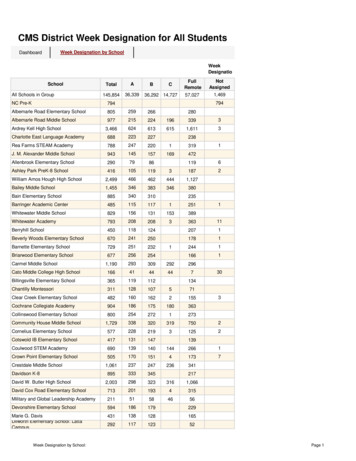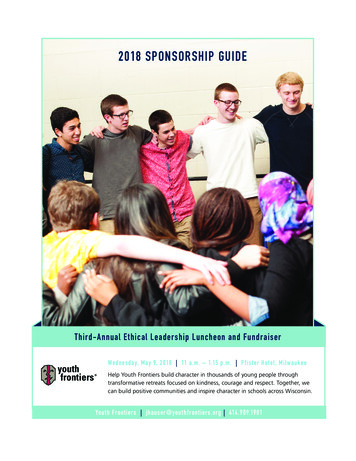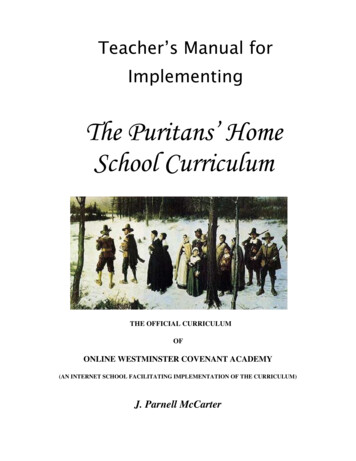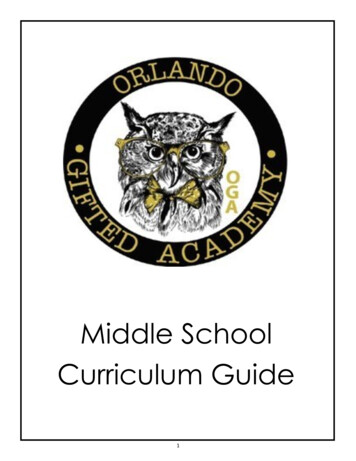
Transcription
Middle SchoolCurriculum Guide1
Curriculum GuideDistrict Vision: To be the top producer of successful students in the nationDistrict Mission: To lead our students to success with the support and involvement of families andthe communityWelcome to Orlando Gifted Academy, where we value respect, creativity, and collaboration! Acaring and dedicated staff is eager to make your time at OGA an exciting and challenginglearning experience. This curriculum guide will be a vital tool in planning a course of study for theschool year. This guide includes general school information, the registration process, as well ascourse descriptions for all core and elective courses offered. Please note the master scheduleand number of course offerings are subject to change based on availability and class size.AdministrationBritt DespenzaPrincipalAddressOrlando Gifted Academy1121 N. Fern Creek Ave., Orlando, FL 32803Telephone: 407-897-6410Fax: 407-897-2417Office Hours7:30am - 4:30pmSchool HoursMonday, Tuesday, Thursday, and Friday: 8:45 am- 3:00 pmWednesday: 8:45am- 2:00 pmJob TitleNameEmailPhone ExtensionSchool CounselorNiccarra BrownNiccarra.brown@ocps.net3472253Staffing SpecialistDawn CannonDawn.cannon@ocps.net3472273Instructional CoachMary Anne DunnMaryanne.dunn@ocps.net3472254Curriculum Resource Teacher/DeanAndrea HaleAndrea.hale@ocps.net3472261Behavior SpecialistEricka Scheid-Atkins Ericka.scheid-atkins@ocps.net3472225Behavior Specialist/ESE TeacherJodi Wuthrich3472281Jodi.wuthrich@ocps.net2
High School Ready StudentsParents/guardians and students are to become partners with school personnel in career exploration andeducational decision-making. Clear academic course expectations that emphasize rigorous and relevantcoursework shall be made available to all students by allowing both student and parent/guardian choice.Required CurriculumStudents must be enrolled in a minimum of 4 classes to be considered a full time Orlando Gifted Academystudent. The successful completion of four core classes (math, science, social studies, and language arts)are required to promote to the next grade level. There is a contract which must be completed with acounselor to enroll the student in an alternative schedule, less than 7 periods a day. A student must meetthe minimum requirements to be promoted to next grade level, and if the minimum passing score is notmet, the student will need to complete summer school, or credit recovery to promote to the next level.The student must successfully complete academic courses as follows:(a) English Language Arts. Three middle grades or higher courses in English Language Arts, which shallemphasize literature, composition and technical text. An intensive reading course shall be provided ateach grade level for those students for whom the district deems such reading instruction appropriate.(b) Mathematics. Three middle grades or higher courses in mathematics. To earn high school credit for anAlgebra I or Geometry course, a student must take the associated statewide EOC for 30% of the coursegrade.(c) Social Studies. Three middle grades or higher courses in social studies, one of which must include thestudy of state and federal government and civics education. (i) Each student's performance on thestatewide, standardized Civics EOC Assessment shall constitute 30% of the student's final grade.(d) Science. Three middle grades or higher courses in science, to include life science, earth space science,and physical science strands.(e) Physical Education. The equivalent of one class period per day of physical education for one semesterof each year is required for students enrolled in grades 6 through 8. A student may waive out of thisphysical education requirement if he/she meets one of the following criteria:(i) The student is enrolled or required to enroll in a remedial course.(ii) The student’s parent/guardian or legal guardian indicates in writing to the school that: a. Theparent/guardian or legal guardian requests that the student enroll in another course from among thosecourses offered as options by the district; or b. The student is participating in physical activities outside theschool, which are equal to or in excess of the mandated requirement.Proper documentation must be provided each year that the student’s parent/guardian is requesting towaive physical education. A new signed request form from the student’s parent/guardian is required foreach additional year that a student is eligible and requests to waive physical education.(f) Electives. Students are provided opportunities in performing/fine arts, academic electives, andspecialized programs. The students will chose from these offerings to complete a 7 course full schedule.(g) Intensive Reading and Math Remediation Requirements(i) For each year in which a student scores at Level l or Level 2 on FSA ELA, the student may beenrolled in and complete an intensive reading course the following year. Reading courses shall bedesigned and offered pursuant to the district comprehensive reading plan.(ii) For each year in which a student scores at Level 1 or Level 2 on FSA Mathematics, the studentmust receive remediation the following year, which may be integrated into the student’s requiredmathematics course.3
Accelerated PlacementAccelerated education experiences may be provided to students within their assigned grade levels andacceleration options will be provided as advanced, high school level, or career technical certificationcourses.Grading ScaleA90-100Outstanding ProgressB80-89Above Average ProgressC70-79Average ProgressD60-69Lowest Acceptable ProgressF0-59FailureFor secondary courses, students cannot receive less than 50% for each quarter grade, semester grade, orfinal grade.Final ExaminationStatewide EOC Assessments and Final Examination Grades(i) All students who take statewide EOC dependent courses, the final examination will count for 30%of the overall course grade. The Semester 1 and Semester 2 grades will each be 35% of the overall coursegrade. The semester and exam grade will be averaged.(ii) Courses which include a statewide EOC at the middle school level: Algebra I, Geometry, andCivics.Common Final Exams and Final Examination Grades(i) All Common Final Exams must count for 20% of the overall course grade for secondary courses.The Semester 1 and Semester 2 grades will each be 40% of the overall course grade for full year courses.For semester courses, the calculation will be conducted as 80% semester grade and 20% CFE grade. Thesemester and exam grade will be averaged.4
Language Arts5
English Language ArtsProgression PlanGRADE 6LanguageArts 1,AdvancedGRADE 7LanguageArts 2,Advanced6
Course DescriptionsM/J Language Arts 1, Advanced 1001020The purpose of this course is to provide grade 6 students, using texts of appropriate complexity, integratedlanguage arts study in reading, writing, speaking, listening, and language for college and careerpreparation and readiness. See advanced descriptions.M/J Language Arts 2, Advanced 1001050The purpose of this course is to provide grade 7 students, using texts of high complexity, integratedlanguage arts study in reading, writing, speaking, listening, and language for college and careerpreparation and readiness. See advanced descriptions.Advanced Courses:Advanced courses offer scaffolded learning opportunities for students to develop the critical skills ofanalysis, synthesis, and evaluation in a more rigorous and reflective academic setting. Students areempowered to perform at higher levels as they engage in the following: analyzing documents andsupplementary readings, working in the context of thematically categorized information, becomingproficient in note-taking, participating in Socratic seminars/discussions, emphasizing free-response anddocument-based writing, contrasting opposing viewpoints, solving problems, etc.7
Math8
Math Progression PlanGRADE 6Grade 6Math,AdvancedGrade 7Math,AdvancedGRADE 7Grade 7Math,AdvancedAlgebra 1Honors9(high schoolcredit)
Course DescriptionsM/J Grade 6 Mathematics Advanced 1205020In this Grade 6 Advanced Mathematics course, instructional time should focus on six critical areas: (1) connecting ratio and rate to whole number multiplication and division and using concepts of ratio and rate tosolve problems; (2) completing understanding of division of fractions and extending the notion of numberto the system of rational numbers, which includes negative numbers; (3) writing, interpreting, and using expressions and equations; (4) developing understanding of statistical thinking; (5) developing understandingof and applying proportional relationships; and (6) developing understanding of operations with rationalnumbers and working with expressions and linear equations.M/J Grade 7 Mathematics Advanced 1205050In this Grade 7 Advanced Mathematics course, instructional time should focus on five critical area: (1) solving problems involving scale drawings and informal geometric constructions, and working with two- andthree-dimensional shapes to solve problems involving area, surface area, and volume; (2) drawing inferences about populations based on samples; (3) formulating and reasoning about expressions and equations, including modeling an association in bivariate data with a linear equation, and solving linear equations and systems of linear equations; (4) grasping the concept of a function and using functions to describe quantitative relationships; and (5) analyzing two- and three dimensional space and figures using distance, angle, similarity, and congruence, and understanding and applying the PythagoreanAlgebra 1 Honors (High School Credit) 1200320The fundamental purpose of this course is to formalize and extend the mathematics that students learnedin the middle grades. The critical areas, called units, deepen and extend understanding of linear and exponential relationships by contrasting them with each other and by applying linear models to data thatexhibit a linear trend, and students engage in methods for analyzing, solving, and using quadratic functions. The Standards for Mathematical Practice apply throughout each course and, together with the content standards, prescribe that students experience mathematics as a coherent, useful, and logical subjectthat makes use of their ability to make sense of problem situations.10
Social Studies11
Social StudiesProgression PlanGRADE 6WorldHistory,AdvancedGRADE 7Civics,Advanced12
Course DescriptionsM/J World History, Advanced 2109020The primary content for this course pertains to the world's earliest civilizations to the ancient and classicalcivilizations of Africa, Asia, and Europe. Students will be exposed to the multiple dynamics of world historyincluding economics, geography, politics, and religion/philosophy. Students will study methods of historicalinquiry and primary and secondary historical documents. See advanced descriptions.M/J Civics, Advanced 2106020The primary content for the course pertains to the principles, functions, and organization of government;the origins of the American political system; the roles, rights, responsibilities of United States citizens; andmethods of active participation in our political system. The course is embedded with strong geographicand economic components to support civic education instruction. See advanced descriptions.Advanced Courses:Advanced courses offer scaffolded learning opportunities for students to develop the critical skills of analysis, synthesis, and evaluation in a more rigorous and reflective academic setting. Students are empoweredto perform at higher levels as they engage in the following: analyzing historical documents and supplementary readings, working in the context of thematically categorized information, becoming proficient innote-taking, participating in Socratic seminars/discussions, emphasizing free-response and documentbased writing, contrasting opposing viewpoints, solving problems, etc. Students will develop and demonstrate their skills through participation in a capstone and/or extended research-based paper/project (e.g.,history fair, participatory citizenship project, mock congressional hearing, projects for competitive evaluation, investment portfolio contests, or other teacher-directed projects).13
Science14
Science Progression PlanGRADE 6ComprehensiveScience I,AdvancedGRADE 7Earth/SpaceScience Honors(high school credit)15Life ScienceHonors
Course DescriptionsM/J Comprehensive Science 1, Advanced 2002050The purpose of this course is to provide opportunities for students to study concepts of science through exploratory investigations, activities, and applications. Science content includes: earth structures, earth systems and patterns, organization and development of living organisms, energy transfer and transformations,motion of objects, forces and changes in motion. Scientific processes include: the role of theories, laws,hypotheses, and models; laboratory investigations, experimental procedures, problem solving, and thecharacteristics of scientific knowledge. See advanced description.M/J Life Science, Honors 200020The purpose of this course is to provide opportunities for students to study concepts of science through exploratory investigations, activities, and applications. Science content includes: earth structures, diversityand evolution of living organisms, heredity and reproduction, interdependence, forms of energy and energy transformation. Scientific processes include: the role of theories, laws, hypotheses, and models; laboratory investigations, experimental procedures, problem solving, and the characteristics of scientificknowledge. See advanced description.Earth Space Science Honors (High School Credit) 20013209This is a rigorous course focusing on high-school level science standards and will require students to behighly motivated, organized and capable of independent learning. Course topics include astronomy,plate tectonics, minerals, rocks and landforms, surface processes, oceans, weather and climate. Thiscourse will also include scientific investigations, which incorporate the use of measurement, laboratory apparatus, problem solving and experimental procedures (designing and performing valid experimental procedures, using mathematics and information for computational thinking to analyze data). This course provides extensive technical reading and writing opportunities in the form of multiple independent scienceresearch projects. This honors course is a high school course. Upon successful completion of this class, students will be awarded high school credit in Earth/Space Science.Advanced Courses:Advanced courses offer scaffolded learning opportunities for students to develop the critical skills of analysis, synthesis, and evaluation in a more rigorous and reflective academic setting. Students are empoweredto perform at higher levels as they engage in the following: analyzing documents and supplementaryreadings, working in the context of thematically categorized information, becoming proficient in notetaking, participating in Socratic seminars/discussions, emphasizing free-response and document-basedwriting, contrasting opposing viewpoints, solving problems, etc. Students will develop and demonstratetheir skills through participation in extended research-based paper/project.16
OGA ElectivesEvery OGA student will have one performing/fine art elective and oneacademic elective.Performing/Fine ArtsAcademicChorusFrenchWorld Music DrummingJournalismTheaterSpeech & Debate2D Art IProject Lead the Way2D Art IIAdvanced AcademicsInformation & Communications Technology ProgramKeyboardingPhotographyMusic TechnologyDanceVideo ProductionEvery student will chose a full year of physical education classes from the boxbelow.Fitness Grade 6 (1 semester)/Comprehensive PE Grade 6/7 (1 semester)Comprehensive PE Grade 7/8 (1 semester)/Team Sports Grade 7 (1 semester)Please note: Electives listed above are not available to all grade levels. See CourseDescriptions and Request Form for grade-level specific details.Levels of classes may be determined based on Prerequisites, Application, or DirectoryPlacement. Electives are possible offerings and are not guaranteed. Offerings will be17
Visual & PerformingArts18
Course DescriptionsM/J Chorus 1 1303000Students with little or no choral experience will begin in Chorus 1 and develop beginning vocal techniqueand skills, critical and creative thinking skills, and an appreciation of music from around the world andthrough time. Public performances may serve as a culmination of specific instructional goals. Students maybe required to attend and/or participate in rehearsals and performances outside the school day to support,extend, and assess learning in the classroom. Public performances may serve as a culmination of specificinstructional goals. Students may be required to attend and/or participate in rehearsals and performancesoutside the school day to support, extend, and assess learning in the classroom.M/J World Music Drumming 1302110The purpose of this course is to enable students to develop basic skills on percussion/vocal music from othercultures and non-Western musical traditions in an ensemble setting using varied middle/junior high literature.Performance techniques and the development of music knowledge are central to this course.M/J Keyboard 1 1301030Students with little or no prior experience develop fundamental piano techniques, learn to read music, applybasic music theory, and explore the role of keyboard music in history and culture. Beginning pianists exploremusical creativity in the form of basic arranging and improvisation, and develop analytical listening andproblem-solving skills. Public performances may serve as a culmination of specific instructional goals.Students may be required to attend and/or participate in rehearsals and performances outside the schoolday to support, extend, and assess learning in the classroom.M/J Music Technology 1303150Students investigate the fundamental applications, tools, history, and aesthetics of music technology.Student musicians explore traditional, current, and emerging technologies, including personal devices; anduse them to explore, capture, create, arrange, manipulate, reproduce, and distribute music. Publicperformances may serve as a resource for specific instructional goals. Students may be expected to attendone or more performances outside the school day to support, extend, and assess learning in the classroom.M/J Theater 1 0400000Students learn the basics of building a character through such activities as pantomime, improvisation, andeffective speaking using articulation, projection, and breathing. Students also learn the importance oftechnical theatre and explore the use of such elements as costumes, props, and scenery. Students practicewriting for the theatre and explore various theatre roles and functions. Public performances may serve as aculmination of specific instructional goals. Students may be required to attend and/or participate inrehearsals and performances outside the school day to support, extend, and assess learning in theclassroom. Public performances may serve as a culmination of specific instructional goals. Students may berequired to attend and/or participate in rehearsals and performances outside the school day to support,extend, and assess learning in the classroom.19
Course DescriptionsM/J 2D Studio Art 1 0101005Students explore media and techniques used to create a variety of 2-D artworks through developing skills indrawing, painting, printmaking, and collage. Students practice, sketch, and manipulate the structuralelements of art. Investigation of artworks from Western and non-Western cultures provide a means forstudents to expand their understanding and appreciation of the role of art in global culture. Student artistsuse an art criticism process to evaluate, explain, and measure artistic growth in personal or group works. Thiscourse incorporates hands-on activities and consumption of art materials.*This course requires a course fee of 20M/J 2D Studio Art 2 0101020Open to students who have taken 2D Art-1. Students in this course will refine art skills and techniques in twodimensional (2D) media. Students will continue to work with the Elements of Art and Principles of Design as away to promote creative risk-taking. This course combines art production with study in art history, aestheticsand art criticism of artworks. Students continue to use written effort to communicate the art criticism processas a way to evaluate, explain, and measure artistic growth in personal or group works. This course consists ofconsumption of art materials and will require a sketchbook as instructed by the teacher.M/J Creative Photography 1 0102040Students explore the aesthetic foundations of art using beginning photography techniques. This course mayinclude, but is not limited to, color and/or black and white photography via digital media and/or traditionalphotography. Processes and techniques for image capture and printing may include, but are not limited to,handcrafted pinhole cameras, hand tinting photographs, mixed media, photo collage, cross-processing,emerging technologies and new media. Content covers the basic mechanics of a camera, including lensand shutter operation, compositional foundations, printing an image for display, and evaluating a successfulprint. Craftsmanship and quality are reflected in the surface of the print, care of the materials, attention tocompositional conventions, and expression of personal ideas and feelings. Student photographers use an artcriticism process to evaluate, explain, and measure artistic growth in personal or group works. This courseincorporates hands-on activities and consumption of art materials.M/J Dance 1 0300000Students develop dance technique and movement vocabulary in two or more dance forms. In the process,dancers demonstrate use of class and performance etiquette, analytical and problem-solving skills, andstudio practices in a safe dance environment. Students may be required to attend and/or participate inrehearsals and performances outside the school day to support, extend, and assess learning in theclassroom. Students in this class may need to obtain (e.g., borrow, purchase) appropriate footwear and/ordance attire from an outside source.20
Course DescriptionsFundamentals of AV & Print Technology 8260300This course will assist students in making informed decisions regarding their future academic andoccupational goals and to provide information regarding careers in Arts, A/V Technology andCommunication career cluster. The content includes but is not limited to the development of leadershipskills, communication skills, and employability skills; resource management; exploration of Arts and AVcareers. Instruction and learning activities are provided in a laboratory setting using hands-on experienceswith the equipment, materials and technology appropriate to the course content and in accordance withcurrent practices.Introduction to Arts, AV Tech, & Communication 8209350The purpose of this course is to assist students in making informed decisions regarding their future academicand occupational goals and to provide information regarding careers in the Additional CTE Programs/Courses career cluster. The content includes but is not limited to: exploration of basic principles, concepts,processes, and knowledge of subject areas to which the student is exposed, specific content based onselected intended outcomes from existing courses, instruction in making career choices and basicemployability skills. Instruction and learning activities are provided in a laboratory setting using hands-onexperiences with the equipment, materials and technology appropriate to the course content and inaccordance with current practices.Information and Communications Technology I (CTE) 9009110This course introduces students to core concepts associated with computers and their use. The contentincludes computer, digital and information technology skills necessary for success in their future academicgoals. In addition to fundamental computer information, the content includes, but is not limited to digitaltechnologies associate with multimedia, word processing, internet communications and cybersecurity.Information and Communications Technology II (CTE) 9009120This course builds on the core concepts associated with computers and their use. The content includescomputer, digital and information technology skills necessary for success in their future academic andoccupational goals. The content includes hands-on opportunities to explore various software applications,including the creation of template based webpage and a base compute program.Students will have an opportunity to earn the following digital tool certificates before completion of eighthgrade: ICT – Gaming EssentialsICT – Multimedia EssentialsICT – Programming & Logic EssentialsICT – Web Design EssentialsICT - Communications EssentialsICT - Computing EssentialsICT - Cybersecurity EssentialsICT - Spreadsheet EssentialsICT - Word Processing Essentials21
Academic Electives22
Course DescriptionsM/J French Beginning 0701000This French course introduces students to the target language and its culture. Students will learn beginningskills in listening and speaking and an introduction to basic skills in reading and writing. Also, culture,connections, comparisons, and communities are included in this one-year course.M/J Journalism I 1006000Prerequisite: Application Required for II **A contract will be required to participate as this course requiresoutside of the classroom activities** The purpose of Journalism I is to enable students to developfundamental skills in the production of journalism across print, multimedia, web, and broadcast/radioplatforms and to become aware of journalism history, careers, ethics use, and management techniquesrelated to the production of journalistic media. Some activities may be required outside of the school day.The purpose Journalism II is to enable students to develop skills in the production of journalism across print,multimedia, web, and broadcast/radio platforms and to become aware of journalism history, careers, ethicsuse, and management techniques related to the production of journalistic media. Some activities may berequired outside of the school day.M/J Speech & Debate 1 1007000The purpose of this course is to develop students' beginning awareness, understanding, and application oflanguage arts as it applies to oral communication concepts and strategies in a variety of given settings.Advanced Academics 7855040This course is designed to enable exceptional students to acquire and apply the skills and abilities needed toenhance academic achievement through experiences which provide enrichment, in-depth learning, and /or accelerated study of academic curriculum requirements. Students who are gifted have learning needsthat go beyond what is traditionally offered in the regular classroom.The nature of their abilities,demonstrated or latent, requires differentiated learning experiences and opportunities for them to maximizetheir potential. Teachers need to develop the depth and quality of their students’ experiences whileadjusting the pace to meet individual needs. This course is meant to be used at each 6-8 grade level andhas been designed for the teacher to select and teach only the appropriate standards corresponding to astudent’s individual instructional needs.23
Course DescriptionsProject Lead the Way Program (CTE)In this program, students will engage in rigorous PLTW courses which is a non-profit organization that givesstudents a chance to identify a challenge, apply their knowledge, find unique solutions and lead their learning in a project based environment. PLTW is designed to include three full years of courses to be started 6thgrade year. Each year the student will take a new STEM course. Descriptions of each year is listed below. **Acontract will be required to participate as this course requires outside of the classroom activities**STEM I 8600012/8600220In this course, students will engage in rigorous PLTW courses in Science of Technology and Medical Detectives. Students will participate in both course topics that discuss the impact of technology of yesterday, today and future. Students will apply the concepts of physics, chemistry, and nanotechnology as well as solvemedical mysteries through hands on projects and labs. Activities include making ice cream, construction roller coasters, investigating medical outbreaks, and dissecting sheep brains. *This course requires a course feeof 20.STEM II 8600052/8600360In this course, students will engage in rigorous PLTW courses in Design & Modeling and Computer Science forInnovators and Makers. Students will participate in both course topics that discover the design process anddevelop and understanding of the influence of creativity and innovation in their lives. students will learnabout programming for the physical world by blending hardware design and software development, allowing students to discover computer science concepts and skills by creating personally relevant, tangible, andshareable projects. *This course requires a course fee of 20.24
PE Electives25
Course DescriptionsFitness Grade 6 1508000This fitness course is designed for middle school students and is intended to be 1 semester in length. The purpose of this course is to provide students with the knowledge, skills, and values they need to become healthyand physically active for a lifetime. This course addresses both the health and skill-related components ofphysical fitness which are critical for students' success.Comprehensive PE Grade 6/7 1508060This course is designed for middle school students and intended to be 1 semester in length. The purpose o
study of state and federal government and civics education. (i) Each student's performance on the statewide, standardized Civics EOC Assessment shall constitute 30% of the student's final grade. (d) Science. Three middle grades or higher courses in science, to include life sc
